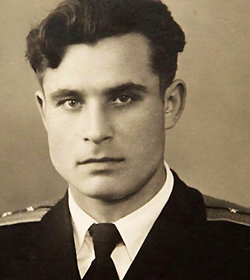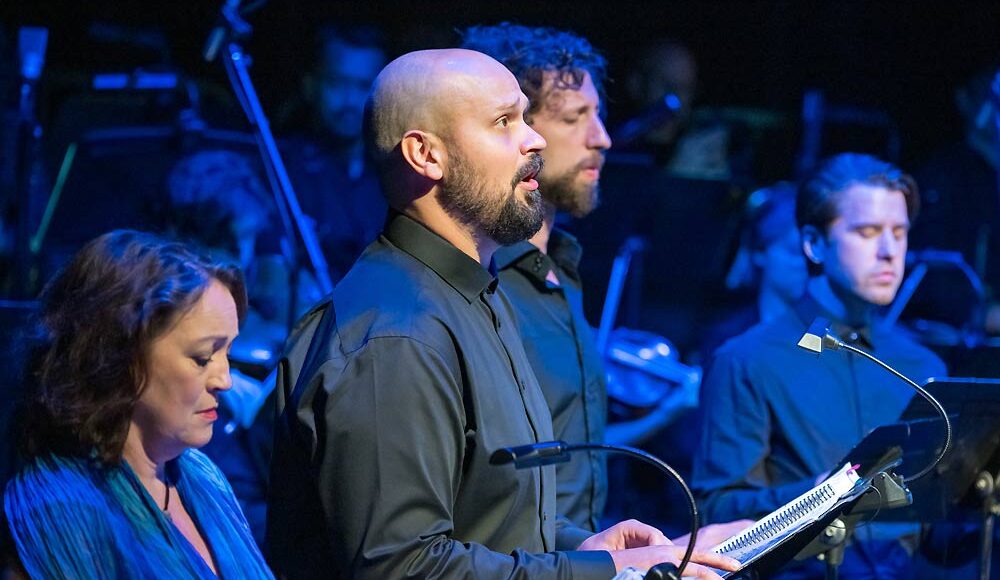By Ernest Kearney — In Cicero’s ancient admonition of the dire consequences which great power imperils, the sword dangling above Damocles is suspended by a single strand of horsehair.
In Arkhipov we are shown, that lacking the support of even the thinnest thread, salvation must depend on a single heart beat.
With the shadow of nuclear warfare darkening the global community once more, Peter Knell and Stephanie Fleischmann’s new opera possesses a disquieting relevance.
In October of 1962 the Cuba Missile Crisis had brought the USA and the Soviet Union to the brink of atomic war, a conflict that would have achieved their mutual destruction and the likely annihilation of all life on this planet.
In responding to the naval blockade of Cuba, imposed by the Kennedy administration after the discovery of nuclear installations on Castro’s island, the Soviet government ordered a detachment of four Foxtrot Class submarines, that included the B-59 which was captained by Valentin Savitsky, into the Atlantic waters to support the delivery of Soviet missiles.
Each sub carried “Special Weapon,” torpedoes armed with nuclear warheads, and each sub was assigned a “Special Weapons Officer” whose sole responsibility was to see to its maintenance. To launch these missiles required, only, an agreement between the captain and the political officer on board.
B-59 arrived in Cuban waters in sorry shape. Days earlier the sub’s freezers had broken down spoiling its provisions. Adding to the unfed crew’s distress, the air filtration batteries had run low resulting in high levels of carbon dioxide and causing temperatures within the craft to reach upwards of 130 degrees, further inflicting the Soviet mariners with dehydration.
Worst still, the sub had lost radio contact with Moscow and were thus cut off from knowing if the world above them was at war or not.
On October 27, a United States Naval group of eleven destroyers and the aircraft carrier USS Randolph located the submerged B-59 on their sonar. Following orders issued by Secretary of Defense Robert McNamara on the October 23, to employ non-explosive practice depth charges to signal any Soviet submarine to surface and identify themselves, the US destroyers began lobbing PDCs into the water above the B-59.
The Russians below were unaware the explosions they heard were from non-lethal devices the size of hand grenades, the Americans above were unaware the sub was capable of a nuclear retaliation. Historian Arthur Schlesinger best describes it; “This was not only the most dangerous moment in the Cold War. It was the most dangerous moment in human history.”
T.S. Eliot thought the world would end in a “whimper.”
History attests, if the world ends, it will be by a “blunder.”

Captain Savitsky, in an exhausted and unstable state of mind, furiously cried out, “We’re going to blast them, now. We will die, but we will sink all of them.” The political officer concurred to the launching. But Arkhipov, deputy chief of staff for the flotilla of submarines, was a passenger aboard the B-59.
He stood against the decision and calmed Savitsky’s fears.
The B-59 was ordered to surface before the American fleet. So the world was spared from World War III and survived to see another day.
With Arkhipov, Composer Peter Knell and Librettist Stephanie Fleischmann have superbly captured this story in their ironic juxtaposition of a tragedy barely avoided within a tragic tale of why it came to be so.
Fleischmann acknowledges the influence of Sophocles in her work, burdening her submariners with the sense that they are facing an inevitable fate. For as Oedipus lived under Apollo’s curse, so the crew of B-59 suffered, as the world did then and does now, under the curse of the atomic age.
Fleischman has richly layered her work with resonances drawn from tales of other doomed sea bearing warriors. Homer’s Odyssey tells of desperate sailors returning home from a senseless war and having to escape monsters to do so. In a distorted image, reflecting off a mirror of the Cold War mad house, the crew of B-59 are forsaking their homes, farms and loved ones in a journey to a senseless conflict. They are not fleeing monsters, but becoming one.
Homer’s Odysseus travels to the underworld, the realm of Zeus’ brother Hades, and encounters the spirits of his dead crew.
In Fleischmann’s opera, Arkhipov (excellently sung by Edward Parks III) is pursued by the ghosts of eight crewmen from K-19, the submarine upon which he previously served as an executive officer. That sub’s reactor’s coolant system malfunctioned, and to prevent a total nuclear meltdown the engineering crew were sent to their deaths.
Arkhipov does not need the furies to pursue him with punishment, he punishes himself and the eight crewmen’s names echo throughout Knell’s composition.
Knell and Fleischmann convey the suffering of Arkhipov and his crewmates masterfully and, with a subtle underplay of constant cords, even imparts a sense of claustrophobia within the B-59’s confines by implying the relentless hum of its engines.
Opera orchestrates human emotions into a musical language and the cast of Arkhipov succeeds in fully capturing the rage, terror, madness and hope of the event itself.
David Leigh, as Captain Savitsky, plays the perfect Ahab to Arkhipov’s Starbuck. In the Special Weapons Officer (Daniel Moody,) Fleischmann has her Tiresias, the blind prophet who warns Oedipus to abandon his quest to learn the cause of the curse afflicting Thebes. Michael Dunlap is memorable as Danil the cook, as is Max Zander as Fima the young sailor who cannot swim.
And Katharine Goeldner as Arkhipov’s wife expertly fulfills the role of Penelope to his Odysseus as well as Fleischmann’s narrative framing device.
The pinnacle performance is, however, Parks as Arkhipov, who shows us that there are no gods that rule our destinies, and if humanity is to be destroyed it will be by a curse we’ve placed on ourselves.
In 2017 Vasili Arkhipov was selected by the board of the Future of Life Institute (FLI) to receive their first Future of Life Award, given to honor those individuals who have acted with unique heroism in service to human survival.
It was an honor well-deserved.
Arkhipov by Peter Knell and Katherine Fleischmann, in commemorating him is another.
Could there ever be enough?
Jacaranda Presented the Concert Premiere of
ARKHIPOV,
an Opera by
Composer Peter Knell
and
Librettist Stephanie Fleischmann
on
October 21 & 22, 2022,
at the Kirk Douglas Theatre in Culver City, CA
* * *
(Note: Featured Image Information: (L-R) Katharine Goeldner (Olga Arkhipova); Edward Parks III (Vasili Arkhipov); David Leigh (Vitali Savitsky); Daniel Moody (Special Weapons Officer)/ Photo Courtesy of Mike Baker)
* * *





